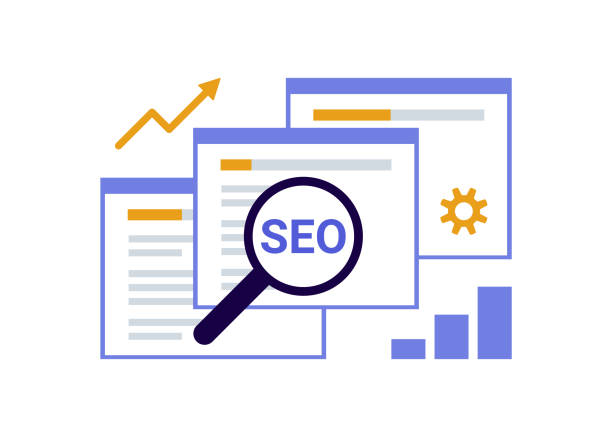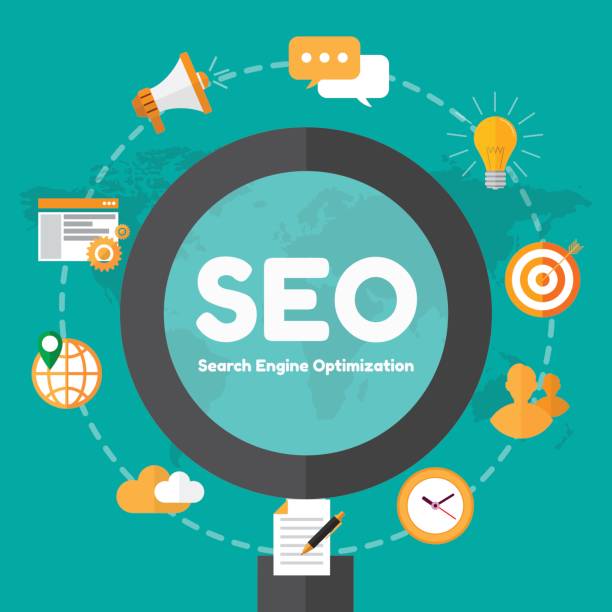An Introduction to SEO and Why It Matters

In today’s world, an online presence is vital for every business and individual.
But presence alone doesn’t guarantee visibility.
This is where #SEO, or Search Engine Optimization, comes into play.
SEO is a set of #techniques and #strategies that help your website achieve higher rankings in the organic (non-paid) search results of search engines like Google, Bing, and Yahoo.
The main goal of SEO is to increase visibility and attract quality traffic to your website.
This section provides a comprehensive explanation to introduce you to the basic concepts of SEO.
Understanding how search engines work and how they index and rank content is the first step towards SEO success.
Without SEO, even the best content might get lost in the vast ocean of internet information and never be discovered by its target audience.
Are you concerned about your e-commerce site’s low conversion rate and not achieving your desired sales?
Rasawob is your specialized solution for a successful e-commerce website.
✅ Significant increase in conversion rates and sales
✅ Professional and user-friendly design to attract customer satisfaction
⚡ Ready for an online sales transformation? Get a free consultation!
Types of SEO and Key Differences

SEO is a vast field that can be divided into different sections, each with its own focus and objectives.
Generally, we have three main types of SEO: On-Page SEO, Off-Page SEO, and Technical SEO.
On-Page SEO refers to all optimizations performed within the website itself, such as content optimization, keywords, title tags, and meta descriptions.
This section is completely under your control and forms the foundation of an SEO-optimized website.
Off-Page SEO includes activities performed outside your website that help increase your domain authority and credibility, such as link building and social media activity.
Finally, Technical SEO relates to the technical aspects of your website that affect its crawlability and indexability by search engines, including loading speed, mobile responsiveness, and site structure.
This specialized categorization helps you gain a comprehensive and structured understanding of the various components of SEO and enables you to plan appropriate strategies for each section.
Keyword Research: The Heart of SEO Strategy

Keyword research is one of the most vital and fundamental steps in any SEO strategy.
This educational and explanatory process helps you identify the phrases and terms your target audience uses to search for information, products, or services in search engines.
Without effective keyword research, your SEO efforts might be fruitless because you’d be focusing on words your potential customers don’t use at all.
Keywords can be “short-tail”, “mid-tail” or “long-tail” each with its own characteristics and advantages.
Choosing the right keywords not only directs more traffic to your site but also ensures that the incoming traffic is relevant and high-quality, which in turn leads to higher conversion rates.
Various tools are available for keyword research that can show you search volume, competition level, and keyword trends.
This initial step ensures that all your subsequent content is built upon the actual needs of users.
| Keyword Type | Description | Example | Competition Level |
|---|---|---|---|
| Short-tail | Short and very general phrases, high search volume, intense competition | “SEO” | Very High |
| Mid-tail | Slightly longer and more specific phrases, medium search volume, medium competition | “SEO site training” | Medium |
| Long-tail | Long and very specific phrases, lower search volume, less competition, higher conversion rate | “Best WordPress SEO method in 2023” | Low to Medium |
Content Optimization: The Backbone of SEO

Content is the undisputed king in the digital world and SEO.
After identifying suitable keywords, the next step is to produce content that is not only optimized for search engines but also engaging, useful, and valuable to users.
Content optimization involves the strategic use of keywords in titles, headings, body text, and meta descriptions.
Furthermore, ensuring high readability, proper structure using H1 to H6 tags, and incorporating relevant images and videos all contribute to improving SEO rankings.
Your content should answer user questions and provide practical guidance.
Engaging content can increase user interaction and extend their time spent on your site.
Remember that search engines reward high-quality and relevant content, so avoid plagiarism and always prioritize originality and added value.
A strong content strategy enables you to continuously attract organic traffic and establish yourself as an authority in your field.
Do you have an e-commerce site, but your sales aren’t what you expect? Rasawob permanently solves your problem with professional e-commerce website design!
✅ Significant increase in conversion rates and sales
✅ Unparalleled user experience for your customers
⚡ Click to get a free consultation with Rasawob!
Technical SEO: A Stronger Foundation for Your Website
![]()
Technical SEO refers to optimizing the technical aspects of your website that affect how search engines crawl, index, and rank your site.
This specialized section includes elements such as site loading speed, mobile compatibility, URL structure, Robots.txt file, XML sitemap, and HTTPS usage.
A website with a slow loading speed can create a poor user experience and cause users to leave your site, which in turn negatively impacts your SEO ranking.
Ensuring your website is responsive and optimized for mobile devices is highly important, as a significant portion of searches are performed via mobile.
Additionally, a logical URL structure and the use of HTTPS for site security and credibility are crucial factors in technical SEO.
Regular review and correction of crawl and index errors, and ensuring the technical health of the website, provide a strong foundation for your overall SEO success.
This aspect of SEO, though less visible, is essential for the correct and stable performance of your website in search results.
The Importance of Link Building in Domain Authority

Link Building is one of the main pillars of Off-Page SEO and a crucial factor in increasing your website’s Domain Authority.
Links act as a vote of confidence from other websites for your content.
The more reputable and relevant websites link to your site, the more search engines recognize your site as authoritative and a reliable source.
This analytical and guiding process includes methods such as creating high-quality and shareable content, connecting with bloggers and influencers, and fixing broken links.
However, it’s important to note that the quality of links is far more important than their quantity. Spammy or irrelevant links can harm your SEO ranking, so you should adhere to White Hat SEO link-building strategies.
Link building is a time-consuming process that requires patience and continuous effort, but its long-term results for increasing your site’s visibility and credibility will be highly valuable and is considered one of the most important factors for improving SEO ranking.
Local SEO and Conquering Regional Markets

Local SEO is a crucial aspect of SEO for businesses whose target audience is located within a specific geographic area.
This explanatory and guiding type of SEO helps you appear in searches where users are looking for local businesses (such as “restaurant near me” or “best car repair shop in Tehran”).
Tools like Google Business Profile play a pivotal role in local SEO.
Optimizing your business profile with accurate information, operating hours, high-quality images, and responding to customer reviews can significantly impact your ranking in local search results.
Furthermore, collecting positive customer reviews, using local keywords in site content, and ensuring the consistency of NAP (Name, Address, Phone number) information across the web are other important factors in local SEO.
Local SEO enables physical businesses to attract potential customers nearby and directly contribute to their sales.
| Local SEO Factor | Description | Impact on SEO |
|---|---|---|
| Google Business Profile | Accurate information, images, reviews, continuous updates | Very high, presence in Google Maps and local results |
| Customer Reviews and Ratings | Quantity and quality of reviews, responsiveness to them | Increased trust, positive signal to Google |
| Use of Local Keywords | Incorporating city, region, street names in content | Increases site relevance to local searches |
| NAP Consistency (Name, Address, Phone) | Consistency of business information across all platforms | Increases credibility and trust with search engines |
Measuring and Analyzing SEO Results for Continuous Improvement

SEO is an ongoing process, and measuring and analyzing its results is essential for continuous improvement.
This analytical and educational section helps you track your website’s performance using tools such as Google Analytics and Google Search Console.
These tools provide vital information such as the number of visitors, keywords that attracted traffic, Bounce Rate, time spent on site, and crawl errors.
Analyzing this data allows you to identify the strengths and weaknesses of your SEO strategy and make data-driven decisions for future optimizations.
For example, if you notice that a specific page has a high bounce rate, it might indicate a need to improve the content or user experience of that page.
Continuous monitoring of keyword rankings and organic traffic helps you keep track of changes in Google’s algorithms and adjust your strategies accordingly.
Without accurate analysis, your SEO efforts would merely be guesswork.
Did you know that 94% of users’ first impressions of a business are related to its website design? With professional corporate website design by **Rasawob**, turn this first impression into an opportunity for growth.
✅ Attract more customers and increase sales
✅ Build credibility and trust in the eyes of your audience⚡ Get a free website design consultation!
The Future of SEO and Upcoming Trends

The world of SEO is constantly changing and evolving.
Search engines continuously update their algorithms to provide the best possible results to users.
Therefore, staying informed about the latest trends and developments is essential for every SEO specialist.
This informative and engaging section explores some of the most significant future SEO trends.
Voice Search and optimizing for it have gained increasing importance as the number of voice assistant users grows.
Artificial intelligence and machine learning also play a prominent role in how search engines understand and rank content.
Furthermore, User Experience (UX) and Core Web Vitals have become more significant ranking factors.
SEO for videos and podcasts, as well as optimization for image searches, are other areas expected to see considerable growth in the near future.
Being prepared for these changes and adapting SEO strategies accordingly will be key to success in the coming years.
These developments indicate that SEO is not just a science but an evolving art that requires agility and continuous learning.
Common SEO Mistakes and Avoidance Strategies

On the path to optimizing for search engines, committing common mistakes can render your efforts fruitless and even harm your site’s ranking.
This guiding and engaging section examines some of the most prevalent mistakes and provides practical solutions to avoid them.
One major mistake is ignoring user intent; that is, creating content without considering the actual goal behind the user’s search.
Overfilling text with keywords (Keyword Stuffing), using spammy and low-quality links, and not regularly updating content are other common errors.
Additionally, neglecting site speed and mobile compatibility can disrupt the user experience and lead to a drop in SEO ranking.
Lack of data monitoring and analysis is also a serious mistake, as without it, you cannot assess and improve the effectiveness of your strategy.
By being aware of these mistakes and applying correct solutions, you can prevent falling into their traps and pave your way to achieving higher rankings in search results.
This approach helps you pursue SEO effectively and sustainably.
Frequently Asked Questions
| Question | Answer |
|---|---|
| What is SEO? | SEO, or Search Engine Optimization, is a process to increase the quality and quantity of website traffic by improving the site’s ranking in natural (organic) search engine results like Google. |
| What are the main types of SEO? | SEO is divided into three main categories: On-Page SEO, Off-Page SEO, and Technical SEO. |
| What does On-Page SEO include? | On-Page SEO includes optimizing elements within the website, such as keywords, Title Tags, Meta Descriptions, content, URL structure, images, and internal links. |
| What is Off-Page SEO? | Off-Page SEO refers to activities outside the website that help improve its ranking, such as Backlink Building, social media marketing, and Brand Mentions. |
| What is Technical SEO? | Technical SEO involves optimizing the technical aspects of a website to help it be better crawled and indexed by search engines. This includes site speed, mobile-friendliness, site structure, Sitemaps, and the Robots.txt file. |
| What role do Keywords play in SEO? | Keywords are phrases that users enter into search engines. Proper and targeted use of relevant keywords in content and site elements helps search engines understand the topic of your page and display it for relevant searches. |
| What is a Backlink and why is it important? | A backlink, or inbound link, is a link from one website to another. Backlinks act as a “vote of confidence” from other sites for search engines and play a significant role in a site’s credibility and ranking improvement, especially if they come from reputable sites. |
| How does quality content impact SEO? | High-quality, relevant, comprehensive, and unique content not only attracts and retains users but also signals to search engines that your page is valuable. This helps improve rankings, reduce Bounce Rate, and increase user time on site. |
| Why is site loading speed important for SEO? | Site loading speed is an important ranking factor for Google. Faster sites offer a better user experience, have lower bounce rates, and are preferred by search engines. |
| Is SEO a one-time process? | No, SEO is a continuous and long-term process. Search engine algorithms are constantly changing, competition is increasing, and site content also needs updating. Therefore, SEO requires continuous monitoring, analysis, and optimization. |
And other services of Rasawob Advertising Agency in the field of advertising
Smart Sales Automation: Professional optimization for increasing website visits using user experience customization.
Smart Brand Identity: An innovative platform for improving click-through rates with intelligent data analysis.
Smart Conversion Rate Optimization: A new service for increasing online growth through SEO-driven content strategy.
Smart Customer Journey Map: Professional optimization for increasing click-through rates using Google Ads management.
Smart Brand Identity: An innovative platform for improving sales increase using real data.
And over a hundred other services in the field of internet advertising, advertising consulting, and organizational solutions.
Internet Advertising | Advertising Strategy | Advertorials
Resources
Fast Click SEO Articles
What is SEO? – Varanda
Webram SEO Articles
WordPress SEO Training – MihanWP
? If you are looking to elevate your business’s online presence, Rasawob Afarin Digital Marketing Agency, with its expertise in corporate website design and providing comprehensive digital marketing solutions, is ready to assist you on your path to achieving your goals.
📍 Tehran, Mirdamad Street, next to Bank Markazi, Southern Kazerun Alley, Ramin Alley No. 6




